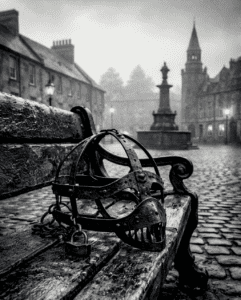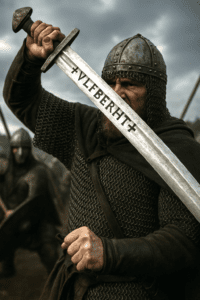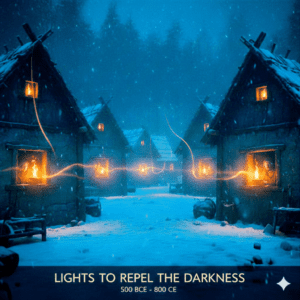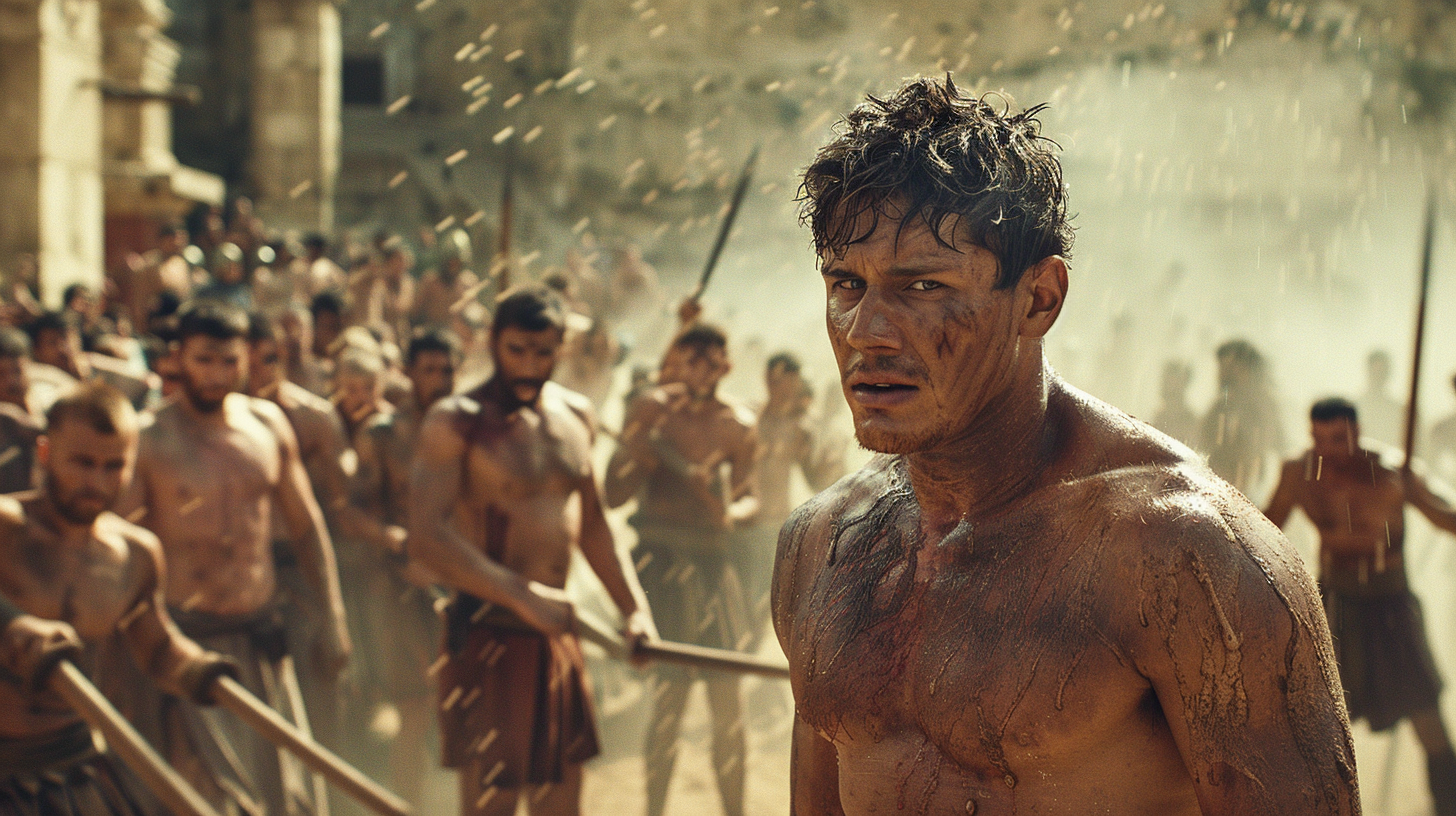
(Historical reconstruction based on documented events)
They promised you glory and freedom. What they gave you was a slow descent into hell.
The smell hits you first.
Blood.
Sweat.
Rot.
Human waste.
It’s so thick you can almost taste it on your tongue. You gag. Your stomach lurches. Nobody tells you about the smell. The recruitment speeches, the lanista’s promises of fortune and fame? They never mention this. The whispered rumours of glory and wealth don’t prepare you for the reality of it.
You’re standing in the underground training yard now. It’s darker than you expected. The walls are slick. Damp. Cold stone against your palm. You don’t want to know what’s making them wet. Your hand comes away sticky.
“Welcome to the Ludus Magnus,” someone says behind you.
You turn. It’s a scarred man with one eye missing. He smiles. It’s not a kind smile. His teeth are broken. Stained brown.
“Most of you won’t leave here alive,” he continues. “That’s just statistics. Accept it now and you’ll suffer less.”
He walks away. You’re left standing in the darkness, your heart hammering against your ribs, wondering if he was joking.
He wasn’t.
Consent, Coercion, and the Price of Survival
On paper, the Ludus Magnus looked prestigious. Built by Emperor Domitian around 80 AD. Purpose-built. State of the art. Wealthy sponsors paid fortunes for fighters trained here.
The lanistae made obscene amounts of money.
But there’s a reason they made so much. And it has nothing to do with honour.
Walk past the public areas. Past where the sponsors tour. Past where they let outsiders see. Go deeper into the facility where the stone gets colder and the screams are louder. That’s where you’ll find the truth.
This place wasn’t designed to create champions. It was designed to break people. Systematically. Methodically. Completely.
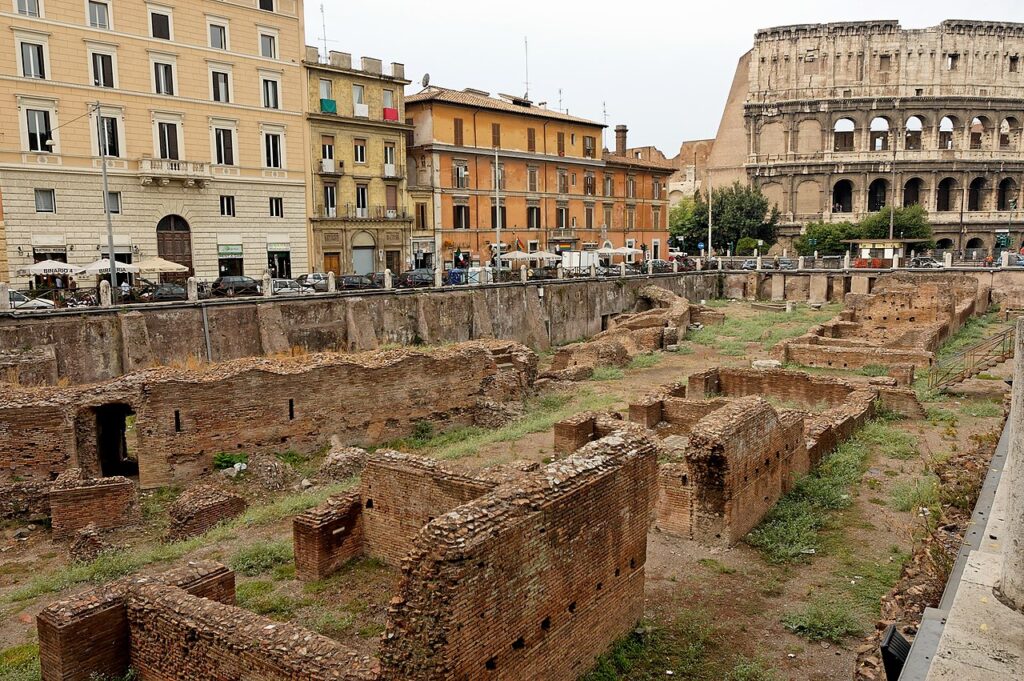
The Intake: Consent and Coercion
You didn’t choose to be here.
Let’s be honest about that from the start. Maybe you’re a slave. Explicitly purchased because you’re young, strong, and desperate. Maybe you’re a criminal. You were given a choice: execution or the arena. It’s not really a choice, is it?
Or maybe you’re poor. So poor that signing a contract that reads like a death warrant seemed better than watching your family starve.
The lanista doesn’t care which category you fall into. To him, you’re all the same. Units. Assets. Disposable.
You sign the paperwork. Or they press your thumb into wax if you can’t read. Either way, you’ve just agreed to be whipped. Burned. Killed. Whenever he decides.
Seneca attended a ludus once. The famous Stoic philosopher. He watched men voluntarily enter this hell, and he wrote about it. His words were disturbed. Horrified. He described watching desperate men sell their bodies to death for immediate payment.
“These are not warriors,” he wrote. “These are the already-damned pretending they have a choice.”
He understood something important. You didn’t come here for glory.
You came here because you had nowhere else to go.
The door closes behind you. Sunlight disappears. You are now property.
The Training Regimen: Calculated Brutality
The day starts in darkness.
Hours before dawn. You’re woken by shouting. Leather cracking against stone. Men screaming.
Around you, dozens of other men begin to move. Some are fresh like you. Terrified. Uncertain. Others are scarred. Dead-eyed. Veterans of this place who’ve learned not to hope.
Your body already hurts, and you haven’t done anything yet.
Inside Rome’s Most Infamous Gladiator School
The yard opens above you like a pit. High walls. No windows. No way out. The heat is suffocating even at this hour. By midday, it’ll be unbearable. You’ll train in it anyway.
Your instructors are scarred. Brutal. They survived years in the arena and came back twisted. They take it out on you. All of it. Every trauma. Every scar. Every moment of powerlessness they experienced.
They demand perfection through pain.
You practice with a wooden sword against a post. Again. And again. And again. Your arms scream. Your muscles burn. Sweat pours down your face, stinging your eyes. The post never tires. The post never shows mercy. The post doesn’t care if you’re dying.
Around you, the sound is relentless.
Thud. Thud. Thud. Wood on wood. Then the crack of the whip. A man near you hesitates. Just for a second. Just a fraction of hesitation. The flagrum comes down across his back, and the sound is like thunder.
His scream echoes off the stone walls. Blood spatters the dust. Red on grey. Fresh on ancient. You smell it. Copper. Iron. Your stomach clenches.
Then it’s your turn.
The whip finds your shoulder blade. The pain is white-hot. Searing. It’s not like anything you’ve experienced before. Your body arches involuntarily. Your lungs empty. You can’t even scream properly because the shock of it steals your breath.
This is normal. This is every day. This is what existing here means. Suffering. Repetition. Pain. Nothing else matters. Nothing else exists.
And then there’s the hunger.
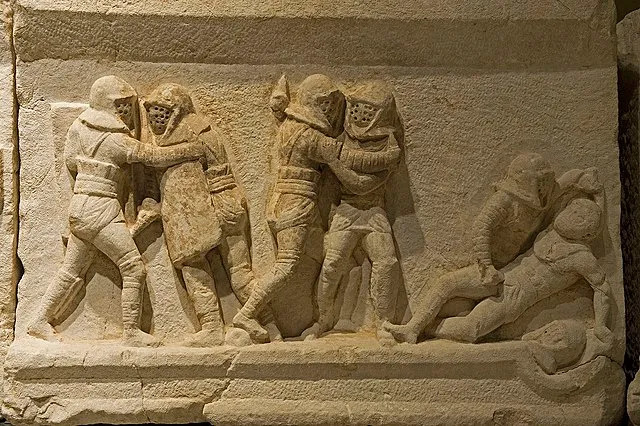
Starvation as Control: The Gladiator Diet of Despair
They starve you deliberately.
Barley. Legumes. Sometimes, rancid meat, if you’re lucky. Never enough to feel strong. Never enough to feel human. The hunger is constant. Gnawing. It fills your thoughts. It makes you compliant.
Your stomach eats itself. Literally, the pain is different from the whip. It’s not sharp. It’s deep. Hollow. A constant ache that never stops. You dream about food. Your mouth waters at the memory of bread. Real bread. Not the hard, mouldy refuse they give you here.
A malnourished man is a docile man. That’s the theory. That’s the practice.
You learn this over weeks. Your body weakens. Your mind gets foggy. You stop asking questions. You stop thinking about escape. You’re too focused on the next meal that may or may not come. Your legs shake when you stand. Your vision blurs at the edges.
Your bones will show the evidence of this starvation centuries after you’re dead. Archaeologists will study your skeleton and shake their heads. Iron deficiency. Malnutrition markers. The physical proof of deliberate cruelty is written in calcium and decay.
But you won’t care about that. You’re too busy trying not to faint during training. Too busy fighting the vertigo. Too busy gripping whatever you can to stay upright.
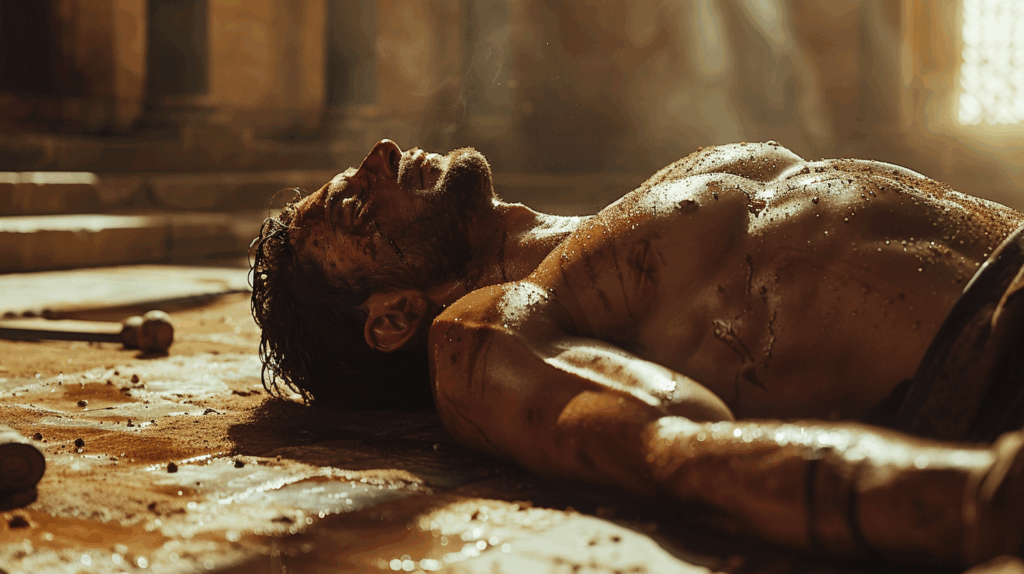
The Bodies That Never Made It to the Arena
They don’t tell you about the death rate.
Not when you arrive. Not when you sign up. Not when you’re still hopeful enough to believe you might survive this.
But you learn quickly.
Ten per cent. Twenty per cent. Some estimates suggest higher. The men around you die before they ever see the arena. Before they ever hear the crowd. Before they ever have a chance to become the celebrities they were promised.
They die from infections. Wounds that turn gangrenous. Sepsis. They die from the heat and dehydration, collapsed in the yard while instructors step over them like they’re nothing. They die in the infirmary, if you can call it that. A windowless chamber deep underground.
A doctor works there. He doesn’t care about healing you. He cares about whether you’re still profitable.
“Can he fight?” the lanista asks.
The doctor examines you. Your wounds. Your fever. Your broken bones.
“No,” he might say.
That’s the last conversation you have.
You watch men carried out on stretchers. Grey skin. Vacant eyes. You never see them again. You learn not to ask where they go. The less you know, the easier it is to sleep at night. Though you won’t sleep well. Nobody sleeps well here.
Deep Dive – Hungry For More Credible History?
What the Bones Reveal
Archaeologists found them.
Skeletal remains of gladiators. Hundreds of them. And the bones tell a story the living tried very hard to bury.
Ribs. Broken multiple times. Not once. Multiple times. Arm bones fractured and improperly healed, permanently deformed. Men who kept training on broken bones because stopping meant death.
Spinal injuries that should have paralysed them. Skull fractures. Teeth knocked out so violently that the jawbone itself bears permanent scars.
These weren’t champions who died gloriously in the arena.
These were men who survived training only to carry their torture in their bones. Walking monuments to systematic brutality. Living proof of what happens when a system is designed purely to break people.
The bones don’t lie. They never do.

The Psychology of Captivity
You are no longer yourself.
Your name means nothing here. It’s gone. You’re given a new one. A Latin epithet. Something that refers to your fighting style. Your origin. Your role in the machinery of death.
The name starts to sicken you. The association is real.
You’re stripped of identity. Autonomy. Humanity. Every single day, the message is reinforced: you are already dead. Your body belongs to Rome. Your life is not your own.
But then something happens.
A visitor comes through one day. Someone from outside these walls. And they recognise you. They know your new name. The name carved into your gladiatorial identity. They’ve heard stories about you.
Something stirs inside. It’s not hope exactly. It’s more dangerous than that. It’s validation. It’s the intoxicating taste of being seen. Being known. Being celebrated.
You matter.
For the first time since you arrived, you feel like you matter.
It’s a trap, and you don’t even realise it’s snapping shut around you.
This brief recognition keeps you compliant. Keeps you training. Keeps you believing there’s something worth surviving for. It’s more psychologically cruel than pure despair ever could be. Despair would kill you quickly. This? This keeps you alive just long enough to suffer.
The Underground Passages to the Colosseum
Then comes the summons.
No warning. No preparation. Just an order.
“The passages,” someone tells you. “You leave at dawn.”
You don’t sleep that night. Nobody does when they’re summoned to the passages.
They’re narrow. Torch-lit. They connect the Ludus Magnus to the Colosseum itself. You’ve heard rumours about these tunnels for months. Stories whispered in the dark. Execution chambers. Bodies disposed of in the shadows. Men who disappeared into these corridors and never came back.
Walking through them now, you understand the rumours were probably true.
The air is different here. Colder. The smell of death is overwhelming. Not metaphorical. Literal. Physical. You can taste it. Decomposition. Decay. It coats the back of your throat like oil.
Your eyes water. The stone walls are slick. Your hand slides on them. You can feel something sticky. Organic.
Your footsteps echo unnaturally loud. Each step sounds like a countdown. Your chest tightens. Breathing becomes difficult. The walls feel like they’re closing in. Are they closing in? The passage seems narrower the deeper you go. Your pulse throbs in your ears. Blood roaring. Deafening.
There’s no sense of time. You could be walking for minutes or hours. Minutes feel like hours. Hours feel like days.
Then you hear it.
A roar. Distant at first. Then growing louder. Fifty thousand human voices screaming for blood. Your blood. The sound hits you like a physical force. Your legs go weak. Your bowels clench.
The passage opens into blinding sunlight and deafening noise.
You stumble forward, blinking. Disoriented. Squinting against the brightness. Your eyes adjust slowly. Too slow. There’s no preparation. No warm-up. You go directly from underground darkness to the arena. Thrust into chaos and violence before your eyes have even adjusted to the light.
The crowd is screaming your name. Or maybe they’re not. You can’t tell. The noise is overwhelming. It’s one continuous roar. It fills your skull. It vibrates in your bones.
Your heart skips a beat. Is it excitement or dread you cannot tell anymore?
This is it.
This is what everything was for.
This is where it ends.
Survivors of the Ludus Magnus
If you survive, you carry it with you forever.
Your body bears the marks. Scars. Deformities. Bones that never healed quite right. Your mind is fractured. You’ve looked death in the face repeatedly and lived. That’s a kind of trauma all its own.
Some fighters earn enough to buy their freedom. They get the rudis. A wooden sword. The symbol that they’re no longer property.
But freedom is a hollow word when you’re broken.
You’re permanently marked. Your body is destroyed. The psychological wounds are immense. Roman society will never fully accept you, even though you survived horrors that most of them couldn’t imagine.
You are a survivor of the Ludus Magnus.
You are also forever defined by it.
The Legacy Underground
Beneath the Colosseum, the Ludus Magnus still stands in ruins.
Archaeologists excavated it. They found the chambers. The training yards. The hidden passages. Water systems are engineered for treating wounds.
Cells for housing the imprisoned. Infirmaries where doctors decided which men were worth saving and which should be discarded.
It was a machine. Perfectly optimised for suffering.
The games were entertainment, yes. But they were built on the systematic destruction of human beings. Their pain, their anguish, their fear.
The Ludus Magnus wasn’t just a training ground.
It was a factory. A place where desperation was converted into profit and humanity into an object that people jeered at.
Echoes in Stone: The True Cost of Roman Entertainment
It worked perfectly for nearly three centuries.
And somewhere in the stone, if you listen carefully enough?
You can still hear the screams.
History romanticised the gladiator, but the stones remember otherwise. The Ludus Magnus was not about courage; it was about obedience — and the bones still whisper which one Rome truly rewarded.
That gives it an echo of meaning after the horror.


